Comic Strip Spread
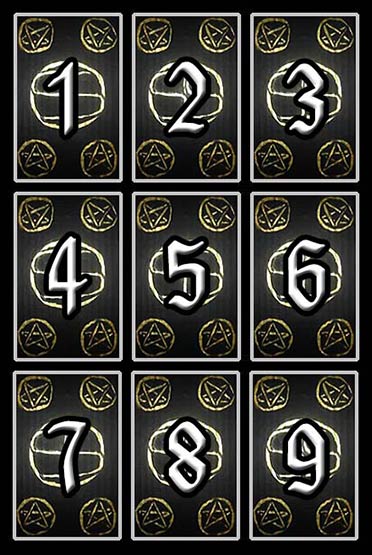
Difficulty: Easy
Note: This spread works best with decks like the Diary of a Broken Soul or Surrealist Tarot because they display scenes rather than pips and do not use reversals.
The Comic Strip Spread is a simple nine-card chronological spread that looks like a page of a comic book. This method should be used to get a glimpse of the future as it would pan out naturally. It may be insightful to use this spread in coordination with biorhythms. The spread is easy to read as a storyboard, just like a comic strip.
The main subject is apparent in the first card, while the story plays out through the following tarot cards.
It is important to pay particular attention to the cards and the relationships with their neighbours. Notice which directions the cards are facing, and how they interact.
Your Comic Strip Reading
Five of Cups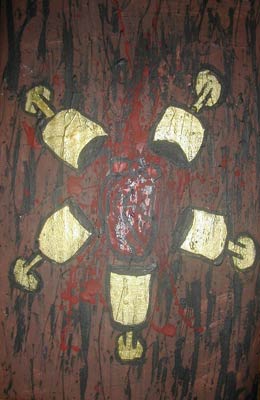 |
King of Pentagrams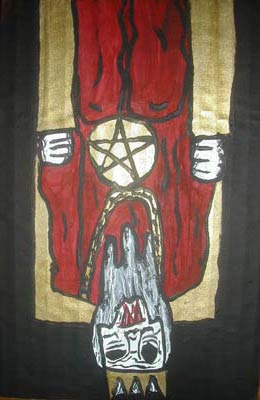 |
Ten of Swords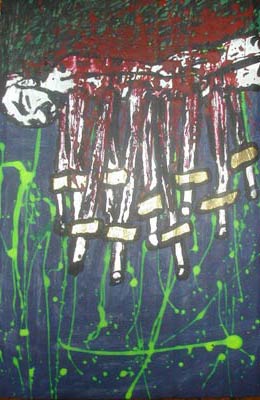 |
Page of Stakes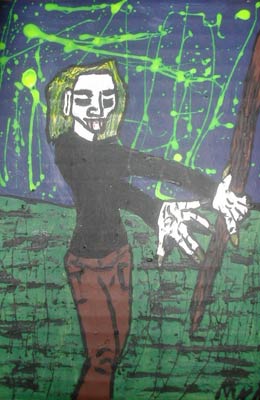 |
Three of Swords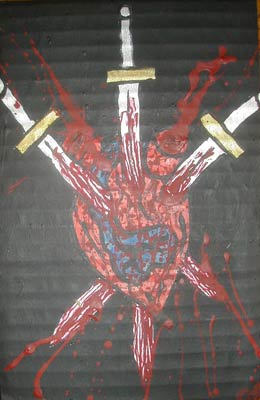 |
Nine of Cups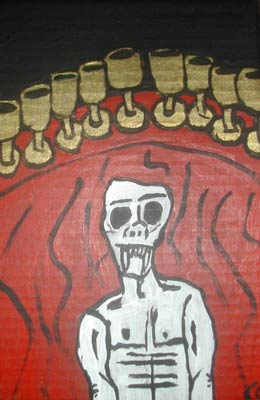 |
Eight of Cups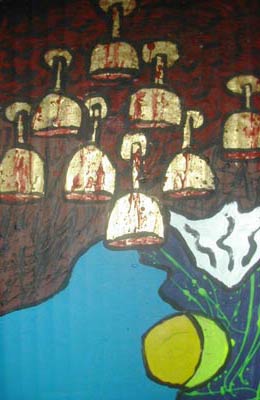 |
King of Swords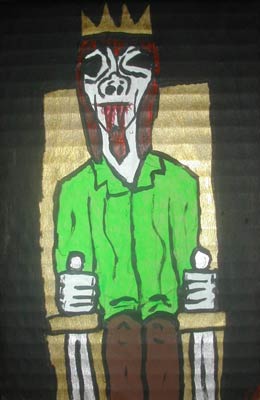 |
Queen of Stakes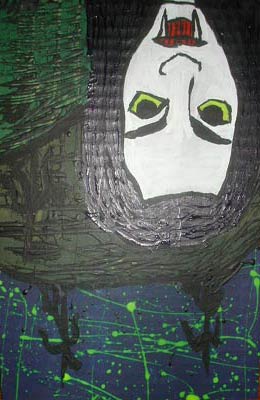 |

Card 1: Five of Cups
Symbolism:
Five toppled cups form a pentagram, with something undiscernible at the center. The destruction and loss are apparent, yet the hidden element suggests that something valuable might still remain.
Meaning:
The Five of Cups represents loss, grief, and emotional upset. It suggests the need to process and mourn a loss, be it personal or emotional. This card encourages you to acknowledge your sorrow while being open to healing. It is also a reminder to focus not just on what has been lost but on what remains.
Keywords:
Upright: Loss, grief, sorrow, reflection, healing, emotional challenges.

Card 2: King of Pentagrams
Reversed
Symbolism:
A wise king adorned with a large pentagram holds his reign in a posture of strength and control. He represents mastery over material resources and the ability to wield power with integrity and wisdom.
Meaning:
The King of Pentagrams signifies success, mastery, and the completion of a journey towards wealth and stability. This card speaks to practical wisdom, resourcefulness, and the ability to create long-lasting success. It encourages you to embody leadership and strategic thinking in your endeavors.
Reversed, it suggests a misuse of power, corruption, or an unwillingness to take responsibility for your actions. It may indicate a lack of integrity or wisdom in handling resources.
Keywords:
Reversed: Corruption, misuse of power, irresponsibility, lack of integrity.

Card 3: Ten of Swords
Reversed
Symbolism:
A male figure lies lifeless, his body pierced by ten swords. The brutality of the scene mirrors the infamous murder of the Black Dahlia, evoking themes of ultimate betrayal and victimization. Blood pools beneath him, symbolizing the depth of his suffering and the irreversible nature of the event.
Meaning:
The Ten of Swords represents total defeat, betrayal, and hopelessness. It signifies the end of a cycle or the culmination of pain, where there is no further descent. Despite its grim nature, the card also holds the promise of new beginnings, as the worst has already passed.
Reversed, this card suggests recovery, triumph over adversity, or the ability to rise again after hitting rock bottom. It reflects newfound strength and the potential for victory through resilience and sheer determination.
Keywords:
Reversed: Recovery, resilience, triumph, power, victory after struggle.

Card 4: Page of Stakes
Symbolism:
A zombified female vampire emerges from her slumber, her gaze hungry and purposeful. She represents curiosity, the thirst for knowledge, and the energy of youthful ambition. The dark tones hint at naivety and the dangers of unbridled enthusiasm.
Meaning:
The Page of Stakes embodies curiosity, enthusiasm, and the beginning of new ventures. This card encourages you to embrace your creativity and explore opportunities with an open mind. It may also signify a message or news that sparks inspiration.
Keywords:
Upright: Curiosity, ambition, inspiration, creativity, news, exploration.

Card 5: Three of Swords
Symbolism:
Three swords pierce a heart, set against a backdrop of dark, foreboding clouds. The heart bleeds, symbolizing the deep pain of betrayal and heartbreak. The ominous sky reinforces the emotional intensity and the sorrow attached to this card.
Meaning:
The Three of Swords is a card of emotional pain, heartbreak, and grief. It represents suffering from loss, betrayal, or separation. The heart pierced by swords highlights the emotional wound, urging you to confront the pain to begin healing.
Keywords:
Upright: Heartbreak, sorrow, grief, emotional pain, loss.

Card 6: Nine of Cups
Symbolism:
A male vampire sits at the peak of drunken contentment, a symbol of ultimate satisfaction and indulgence. The cups around him represent the emotional fulfillment that results from victory and excess.
Meaning:
The Nine of Cups represents emotional satisfaction, contentment, and fulfillment. It indicates that your desires are being met and that you are experiencing joy in its fullest form. It can also be a sign of physical satisfaction or emotional abundance, often linked to wishes being granted.
Keywords:
Upright: Contentment, fulfillment, satisfaction, emotional success, victory.

Card 7: Eight of Cups
Reversed
Symbolism:
Eight cups filled with life-giving sustenance fuel the party at dusk, urging the participants to break through to a new experience. The card reflects the need for a transformative journey.
Meaning:
The Eight of Cups signals a turning point, where something needs to be left behind in order to move toward new emotional growth. It often signifies the need to leave behind past emotional attachments to make room for new experiences. It can also point to personal growth and a desire to transcend superficial satisfaction.
Reversed, it suggests a period of emotional abundance, joy, and fulfillment. It may also represent staying in a comfort zone when it's time to move forward.
Keywords:
Reversed: Abundance, contentment, staying in comfort, fulfillment, joy.

Card 8: King of Swords
Symbolism:
The King of Swords sits on his throne, holding two swords of justice crossed in front of him. His gaze is piercing and authoritative, reflecting a mastery of reason and balance. The environment around him is austere, emphasizing his focus on logic, law, and the pursuit of truth. His presence radiates power, intellect, and discipline.
Meaning:
The King of Swords symbolizes authority, rationality, and the power of thought. He embodies clarity, fair judgment, and leadership, urging you to approach situations with logic and integrity. This card often appears when strong leadership or impartiality is needed to resolve a conflict or make a critical decision.
Keywords:
Upright: Authority, clarity, intellect, fairness, leadership, logical reasoning.

Card 9: Queen of Stakes
Reversed
Symbolism:
The Queen of Stakes stands proudly, her fangs bared in defiance. The impaled victims behind her serve as a stark reminder of her strength and resolve. She is both nurturing and fierce, embodying the duality of creation and destruction.
Meaning:
The Queen of Stakes symbolizes independence, confidence, and the ability to lead with compassion and strength. She encourages you to harness your inner power and remain true to yourself. This card often indicates success in business or personal endeavors.
Reversed, the Queen warns of jealousy, deceit, or opposition. It may also suggest a lack of self-confidence or struggles with balancing emotions.
Keywords:
Reversed: Jealousy, deceit, insecurity, opposition, imbalance.
